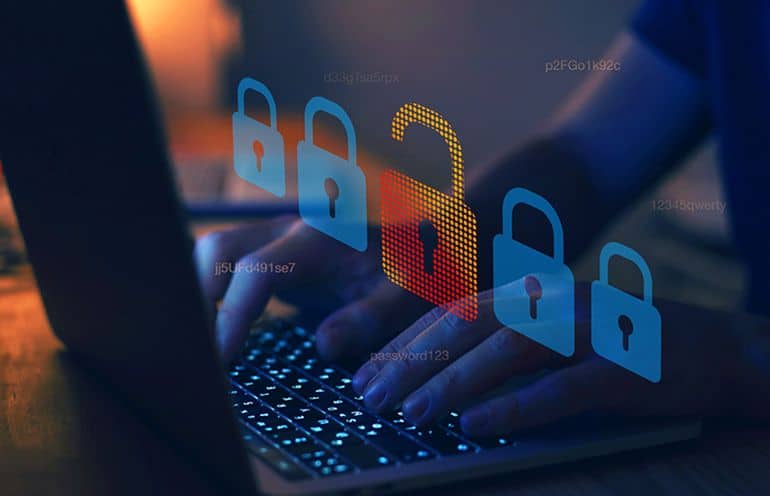Think Again About the Cybersecurity Risks of Small Law Firms.
It is astonishing how often small law firms tell us that they are too small to be at serious risk for cyberattacks. Anecdotally, we can tell them of many successful attacks on small law firms, though our knowledge is derived from successful attacks where we’ve been called in to investigate or remediate the damage, so we cannot identify the law firms.
Nevertheless, there are plenty of publicly known small firm breaches. In fact, we have a file cabinet drawer full of articles and reports of law firm data breaches (small and large) going back 20 years. We built this collection because we continually have to persuade law firms, especially the small ones, that they are at risk.
Why Are Small Firms at Great Risk?
For starters, solo and small law firms don’t have an exorbitant budget to provide for heavy-duty cybersecurity. As a result, they generally rely on their IT provider — which normally does not have cybersecurity certifications — to provide their cybersecurity.
As we’ve said for years … IT is NOT the same as cybersecurity.
Don’t get us wrong — we are not bashing these providers. Many of them are wonderful IT support folks, and they come at an affordable price. And without a doubt, all good IT providers know something about cybersecurity. Nonetheless, in the perilous world in which we live, small firms need to up their game with assistance from bona fide cybersecurity professionals.
Yes, some are costly, but there are plenty of affordable small cybersecurity firms.
One thing attackers know for sure: Small firms are less protected from attacks — and that makes them desirable (and easy) targets.
You may be small, but you still hold the valuable data of many people and small businesses. If you are easy to break into, and criminals armed with your data can then attack your clients, that’s a very good payday for them. And just like all businesses, most cybercriminal groups are happy with a certain level of profit — and many of them wish to avoid the increased attention and scrutiny from law enforcement and governments that result from attacks on ‘big game’ firms.
Small and Midsize Businesses: Scary Cybersecurity Stats
Recently, we saw statistics from both Accenture’s Cost of Cybercrime Study and Ponemon’s Institute’s State of Cybersecurity Report — and very useful statistics they are. They are not specific to law firms but relevant all the same. In fact, we would wager that the law firms in general are in worse shape than the other small and mid-sized businesses.
Accenture’s study found that 43% of cyber attacks are targeted at small businesses, with only 14% prepared to defend themselves.
According to Ponemon Institute’s State of Cybersecurity Report, small to medium-sized business globally state the following, with respect to cyberattack risks:
- Insufficient security measures: 45% say that their processes are ineffective at mitigating attacks.
- Frequency of attacks: 66% have experienced a cyberattack in the past 12 months.
- Background of attacks: 69% say that cyberattacks are becoming more targeted.
The most common types of attacks on small businesses include:
- Phishing/Social Engineering: 57%
- Compromised/Stolen Devices: 33%
- Credential Theft: 30%
The long-term costs of a data breach last for months to years and very often they involve significant expenses that entities are not even thinking about or anticipating in their planning.
What might this include? Lost or inaccessible data, business disruption, revenue losses from operational downtime, breach notification costs, legal liability costs and reputational damage. We would add the significant legal costs of hiring a data breach lawyer to oversee the breach response and a digital forensics company to investigate and remediate the breach.
For SMBs of all kinds, legal or otherwise, these statistics should be shared with those in charge of overseeing your cybersecurity. And, for heaven’s sake, make sure you have an Incident Response Plan. According to the 2021 ABA Legal Tech Survey, only 36% of law firms have such a plan.
Remember this famous quote from Benjamin Franklin, “Failing to prepare is preparing to fail.”
Ethics and Your “Get Out of Jail Free” Card
While lawyers are compelled ethically to safeguard their confidential data and to be competent, including being competent with their use of technology, ethics opinions consistently hold them to a “reasonable” standard.
Two things to bear in mind:
What is “reasonable” for most small firms is less than what would be reasonable for a large firm.
Exceptions might include a small but prominent boutique firm or a “Big Solo” firm in which (often) a prominent attorney has a small clientele but the clients may be large and their security needs for their counsel much greater.
Also bear in mind that what is “reasonable” changes.
Today, most cyberinsurance companies regard two-factor authentication, Endpoint Detection and Response software, cybersecurity awareness training for employees, prompt patching of known vulnerabilities, backups which are impervious to cyberattacks and data breach monitoring as “reasonable.”
Before you protest that all this is too expensive, 2FA is usually free — and the rest of the requirements can be easily met at a budget-friendly price. You just need to find experts who are not focused on the AmLaw 100 but on serving solos and small law firms.
Final Words About Small Law Firm Cybersecurity Risks
It is often said that “If you can’t afford security, you can’t afford a breach.” And a nod to Sean Connery in “The Untouchables” for his famous quote: “Here endeth the lesson.”
Sharon D. Nelson is a practicing attorney and the president of Sensei Enterprises, Inc. She is a past president of the Virginia State Bar, the Fairfax Bar Association and the Fairfax Law Foundation. She is a co-author of 18 books published by the ABA. snelson@senseient.com
John W. Simek is vice president of Sensei Enterprises. He is a Certified Information Systems Security Professional, Certified Ethical Hacker, and a nationally known expert in the area of digital forensics. He and Sharon provide legal technology, cybersecurity and digital forensics services from their Fairfax, Virginia firm. jsimek@senseient.com.
Michael C. Maschke is CEO/Director of Cybersecurity of Sensei Enterprises. He is an EnCase Certified Examiner, a Certified Computer Examiner (CCE #744), a Certified Ethical Hacker, and an AccessData Certified Examiner. He is also a Certified Information Systems Security Professional. mmaschke@senseient.com
Illustration ©iStockPhoto.com
More Cybersecurity Tips:
- Ransomware Today: Top Tips for Law Firms (Get these 14 things done and you’re way ahead of most of your colleagues)
- Cybersecurity Trends: 25% of Law Firms Have Been Breached
- Shadow IT: A Serious Threat to Law Firms
Subscribe to Attorney at Work
Get really good ideas every day for your law practice: Subscribe to the Daily Dispatch (it’s free). Follow us on Twitter @attnyatwork.
















